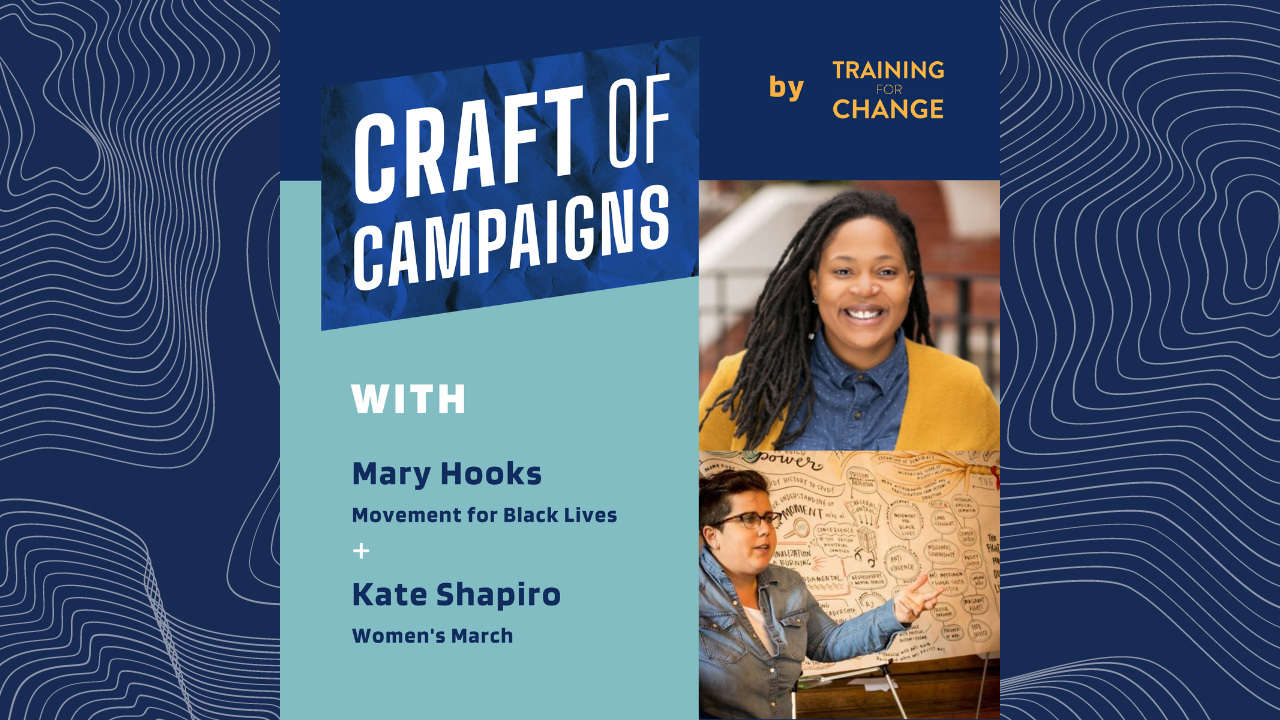The Craft of Campaigns podcast highlights stories and lessons from issue-based action campaigns beyond one-off mobilizations and single election cycles. Campaigns channel grassroots energy to win concrete victories, build winning coalitions, and topple pillars of power standing in the way of justice. In each episode, we interview organizers about how a campaign unfolded, the strategy decisions they made, and the lessons we can draw for our current moment. You can read the writeup below or check out the full podcast here.
In 2010, the leadership of the multiracial, queer basebuilding organization Southerners on New Ground (SONG) set a five-year plan to expand their base in regions outside Durham and Atlanta. According to Mary Hooks, who came on staff as an organizer in 2011 and who would later become the group’s co-director, the question was, “How can we leverage the infrastructure of the regional organization in order to get some concrete wins and material changes for our people while also embodying and demonstrating what intersectional organizing looks like? Not just the identity politics stuff.”
SONG engaged in issue identification work, surveying members and queer people throughout the South and consulting the organization’s elders and strategic advisors. Their advisors suggested focusing on public education. But their member surveys led them towards criminalization. Mary remembers: “They would say, ‘I’m not sure about public education, but I will tell you I’m struggling in public [space].’ Whether that was a little homey, Chuy Garcia, right outta Durham who was killed at a skateboard park, and it had really energized and charged up a lot of people there… we went to Charleston, even the queer clubs were overly policed. We started with the banner of ‘beloved community’ and that was going to be our work around public education. And then we decided to focus more around criminalization under the banner of freedom from fear.”
Drilling down even further into the issue, SONG’s Atlanta chapter decided to focus on unjust fines and fees assessed to (overwhelmingly Black) defendants in the region’s courts. To learn more about the problem, the group participated in court watching, connected with defendants who had missed a scheduled court appearance, and engaged in more formal study and political education, reading books like The Condemnation of Little B to understand the history of criminalization.
As they got deeper into relationship with the people they encountered, their demands and understanding of their targets evolved. Mary explains: “Initially our demand was ‘no fines and fees,’ and we wanted folks to be able to volunteer to do meaningful community service because we had talked to folks that had been forced to wash cop cars as their community service. And then we added a demand to end the automatic bench warrants that get issued when folks fail to appear at court. I think that we added the bench card demand because we saw all the crazy shit in court watch where they’d be like, ‘Oh, you got a cell phone. You can pay this $700.’
“We were also getting punted back and forth between City Council, the local city judges, and the Mayor. They would each say, ‘No, no, no, we don’t make the decision. The judges make the decision.’ ‘No, we don’t make the decision. The Mayor makes the decision.’ Literally everybody was telling us opposite things. They were just trying to play us.”
Rather than continue to research and speculate on who moved the pillars of power, they decided to test their power map through direct action on Deputy Chief Judge Christopher Ward, who had oversight over most “failure to appear cases” and who had refused to meet with SONG. Playing off the theme that Ward had “failed to appear” for their communities, SONG Atlanta teamed up with a local artist to design a fourteen-foot-tall “failure to appear” summons, which they held outside the court during the daily line-up to reach the metal detector while another team went into the courtroom.
Mary remembered: “We had little ‘Judge Ward failed to appear’ signs. We had rolled them up and, of course, we put glitter in them. We intentionally sat at the front of his courtroom, and when they said, ‘All rise,’ we all stood up like everybody else, but we opened up our posters — glitter falls out, glitter bombing essentially. And then he’s like, ‘What is this? This is a courtroom, not a street corner.’ And kind of does like this chastising thing. And we’re like ‘Answer the fucking phone,’ and we walk out.” But that wasn’t the end. “He sends the bailiff after us, who says, ‘The judge wants to meet with you in his chambers.'”
They had finally won their meeting, but the judge refused to consider their proposals for more dignified community service and ending the use of bench warrants. “And that’s all we wanted, for him to be able to look us in the eye and tell us that he wouldn’t go meet our demands. ‘Great, enough said, sir.’ So now we know we can escalate in good conscience,” said Mary.
Over the course of 2015 and 2016, the group expanded its court watch program and engaged more people with community town halls, gearing up for what they thought was a public fight centered on fines and fees.
But what if there was a demand that would get closer to the root cause of the problem? “We were going to the Failure to Appear courtrooms,” Mary recounted, “but we had slipped into or accidentally went into the First Appearance courtroom, and we hadn’t before. And once we sat in there, I remember thinking, ‘This is a different entry point, cause if we can address folks staying in jail cause they can’t afford their bail, they’ll be less likely to cop out or take a plea deal or just pay a fine. If we intervene here, we don’t even have to perhaps even deal with the fines and fees.'” Having defendants sit in jail because they can’t afford bail is a way prosecutors can put pressure on plaintiffs to plead guilty, incurring fines and fees. But if they were out of jail, Mary thought, they would be less likely to plead guilty in the first place.
They wanted to find a shared issue to unite their different chapters, and maybe they had found it. Kate Shapiro, a SONG staff organizer at the time, explained: “The folks in Richmond were working to prevent the expansion of a jail, Durham was doing a whole bunch of other organizing, we were organizing in Atlanta, we were doing organizing in Birmingham, but it was all under the broader umbrella of criminalization of black queer and LGBTQ people. Everybody was picking different issues, which makes sense, but it meant that it was [tough] for us as campaign newbies, in some sense, trying to support all of these chapters. They all had different targets, they all had different demands. We started to think, what would it look like…to test a shared demand or a shared issue across the region so that we could help people feel less isolated and more connected? We could leverage our power and we could leverage our lessons versus being like, everybody’s going after a different city manager versus council versus mayor versus judge.”
They consulted their members in late 2016. Every single person they talked to had been impacted by the bail system, and many found inspiration in the idea of campaigning on the issue. According to Mary, “that was a game changer.”
They were also ready for a recruitment reset. SONG absorbed many new members during the mass uprisings against police violence that took place from the fall of 2014 through the end of 2016. But by the end of that year, Mary had seen how unsustainable the cycle of rapid response had become: “By the time January came, I remember us saying ‘Comrades, we cannot continue to move like this. It is unprincipled for us to continue to mobilize brave folk out. We just be downtown. You know, just mad, without a demand, without a demand and a strategy. And so that’s when we brought together our base and began to reflect on some of the things that we were seeing as related to fines and fees.”
In the spring of 2017, SONG got to work helping chapters prepare for the first bailout campaign by teaching them how to write fundraising toolkits, host house parties, and learn to identify who needed help posting bail. The first Black Mama’s Bailout freed 64 women in seven cities, raised over $200,000, and engaged 350 SONG members. As anticipated, it helped SONG’s members and staff identify campaign opportunities, including how to put divest/invest into practice. As Mary put it, “We could literally say coming out of bail how many people needed beds… to be able to get mental health or drugs treatment, how much housing people needed. It was clear where the gaps were.”
The bailouts also helped SONG Atlanta draw more visibility to the group’s campaign to make bail a more prominent issue in the 2018 municipal election. In November, Councilmember Keisha Lance Bottoms was elected mayor. “She’d been our nemesis on Council,” said Kate. The group had criticized her along with the rest of the council, which they saw as providing a lack of oversight for local courts and jails. “But she had already forecasted that she was willing to look at bail, I think specifically because of the bailouts and some of the national climate.” Mary agreed: “She had some promises to fulfill, otherwise she would’ve lost [the election].”
When Bottoms announced her intention to end bail in her first 100 days in office in February 2018, SONG worked with Law for Black Lives to develop their own proposed ordinance. They packed the council chambers during hearings on the bill, rebutting opponents who testified in favor of continued wealth-based incarceration. Their actions shaped public understanding of the issue. As Kate noted, “We shifted the conversation profoundly in those council meetings by who we brought and who we held space for versus it just being the lawyers and then the random people that always talk at every city council meeting for the last forty years.” Just a few weeks into Bottoms’s term as Mayor, the City Council passed an ordinance banning the cash bail requirement for low-level offenses.
Within a year of the legislation going into effect, the daily jail population dropped from an average of 700 to just forty detainees. (The reduction was helped by another campaign win: getting Mayor Lance-Bottoms to cancel the jail’s contract with ICE.) The victory led them to make an even larger demand: to close the jail. “[Our partners] Women on the Rise had been saying for years, ‘They need to close that damn jail’. And so once the bail legislation passed and we are all over here, like, tired as shit…they begin to reassemble and recharge the city with a new demand: It’s time to close the jail because it’s empty.” The Atlanta City Council voted to close the Atlanta City Detention Center in April 2019, but the campaign is ongoing, with a new phase to pressure a different mayor and City Council not to lease the almost-empty jail to a neighboring county.
There are many lessons that campaigners can learn from SONG’s willingness to scout new campaigns that resonated with their members, their work to assess the power of potential targets with “test” direct actions, and their ability to switch focus to get at the root of a problem like wealth-based incarceration.

